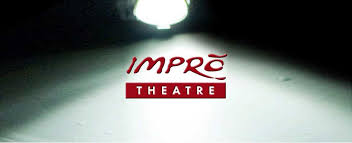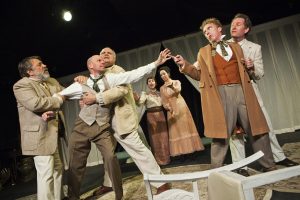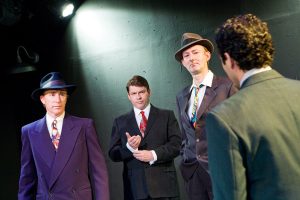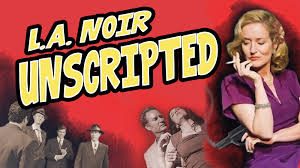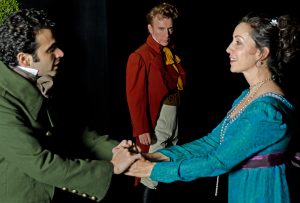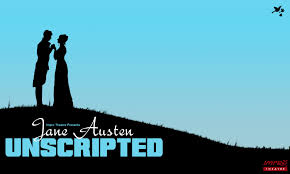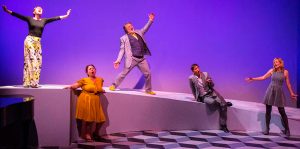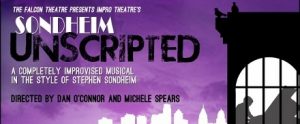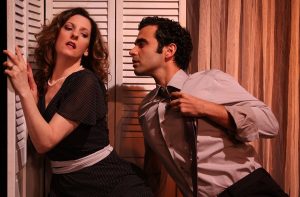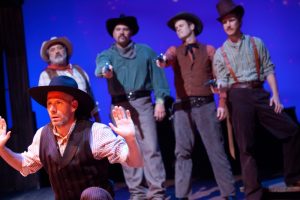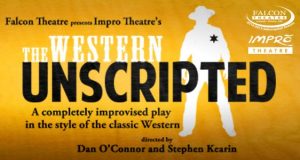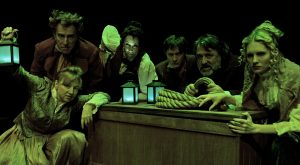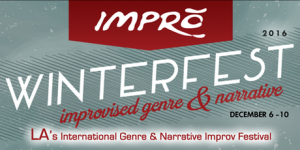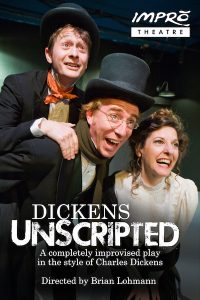IMPRO FOR THE HOLIDAYS
-dad-
Family sucks. Spending time with the people you moved away from is so un-American, so anti-Manifest Destiny, such an embarrassing parochial guilt-trip, that it’s been relegated to the worst weather of the year. What we call the holidays are a “let’s get it over with” season of grown siblings reduced to the competitive roles of their formative years, barely tolerant of their out-of-touch parents and yet somehow unable to escape the obligation of a bloody annual auto-da-fé.
Kids embody the gravity drawing us toward the black hole of home; as soon as you’ve got your own brood, the happy young-adult years of orphan Christmases fade away. No longer can you choose your yuletide companions from the friends you’ve made yourself. No longer does “we can’t afford the trip this year, mom” suffice; odds are that if they can swing it, your parents will pay an airline to act as a proxy tractor-beam, sucking you and your resentments, your faded dream of independence, and your innocent children back to the vicious circle. Hell is other people you’re related to.
No wonder kids of all ages like to sneak away from the cloying warmth and forced small talk, the inevitable football and Peter Billingsley on television, to hide in basements and attics with Internet lifelines to the world outside, or to take long walks around the neighborhood with pint bottles or Vicodin (“Is dad’s back still bothering him?”) or thoughtfully rolled joints.
But that first few hours’ panic-stricken boredom is actually the sweet spot, the safest part of the whole ordeal. You’ve still got food to prepare, place settings to lay, wines to sample and egg to nog, all the little errands invented to postpone the sinking horror of the family dinner itself.
At the dinner table there is nowhere to hide, no way not to look the devil in the face. And the devil wants to talk to you. If you’re lucky you can sit at the kids’ table. But the adult at the kids’ table is despised by all, a loser who fits noplace.
Just me?
November saw Impro Theatre’s inaugural run of Home for the Holidays, a two-act improvisation in the studio laboratory that stuffed an extended family in loud sweaters into a traditional house of pain. Suggestions from the audience pocked the characters with secrets (at the performance I saw, a creepy uncle had left his child at home in a cage; a sexy aunt had just quit Wall Street to work in porn; five or six others as strong) that informed the house-party shenanigans and helped create relationships.
The second act consists of the performers consuming a holiday feast as they tear into each other. To fork up real pie and roast chicken onstage is something of a departure for a company so rigorous in its imagined realities, including a serious concentration on mime. But one of Impro’s many delightful qualities is that it is not dogmatic or academic. It is a practical, living institution, and its ethics are admirably situational. When they improvise in the style of Twilight Zone or Jane Austen, performers mime cigarettes or carriage rides; when they do Noir or Western, they carry pistols.
Actors like props, even disciplined actors who write while they act while they direct. You can trust discipline. Discipline breeds restraint. Restraint informs taste.
-mom-
It’s a fact that over fifty years since headliners like Elaine May and Mike Nichols used improv as a vehicle to stellar careers, one still expects an improv troupe to lack qualities like discipline, restraint, and taste. Most people who pay to watch their first improv show are not moved to pay again. The richest exhibits under the improv tent remain largely unvisited. The word’s primary association is still with college kids cracking themselves up.
But as actor training, improv has never been more popular. Its practice of wakefulness complements and extends the 20th century trend toward the living moment in camera and stage acting. Every serious repertory program now includes improvisation. Still, as immediately rewarding as it is to stretch yourself in class, improv is up there with dance and music as an artistic long game. Few have achieved mastery. A few companies in the world, a dozen or two at most, can approach the consistent command of Impro Theatre. And commercial application of the intact forms is very limited, so the discipline is monkish, rewarding the spirit and tangentially enriching other forms, other arenas. There is no money in it.
With little training and practice, a moderate talent can work as an actor. After ten years she’ll be better, but she’ll be good enough (if ever) within three or four. After four years of improv the majority of students, while much-improved as actors, have just begun to assess improvisation’s performance potential. This is half of the reason why it still doesn’t rival stand-up or sketch comedy as a prevalent form. The other half is the glut of unwatchable improv on offer at bars, comedy clubs, theater late-nights, church basements, parking lots, streetcorners, public transit and presidential debates. What most improv troupes present is more important to their development as artists than to my development as an audience; mostly what I see advertised are workout sessions, a public performance of private study, as far from what Impro does as red is from green.
At great cost to nuance and detail, one could describe the improv family as schismatic and factional: shortform is the outgoing older brother, longform the quiet, introspective sister. Shortform covers the sketch- and joke-oriented games that give improv what tenuous hold it has on the popular imagination; these are associated with Saturday Night Live actors – Chicago’s Second City troupe trained many, as did L.A.’s Groundlings; New York’s Upright Citizens Brigade produced Amy Poehler. But improv’s delineations are not as simple as long vs short: The UCB and Improv Olympic schools, though divergent, are both largely predicated on The Harold, a longform structure credited to Del Close, which gives more emphasis to creating character, story and theme.
Then there’s what the west coast did with longer forms, not to say longform (branding has not been a salient feature of most improv). In Whole Earth environments like Seattle and San Francisco at least since the 1970s, and in Los Angeles since soon afterward, what’s now called genre and narrative improvisation has quietly come into its own. A wave of improvisers started inviting actors and writers to learn improv and perform a new style, focusing less on laughs than on the elements of drama. People like Floyd VanBuskirk (who co-founded Seattle Theatresports) and Brian Lohmann and Mike McShane (who ran Pulp Playhouse in San Francisco and performed in the seminal group Faultline) continue this work with Impro Theatre.
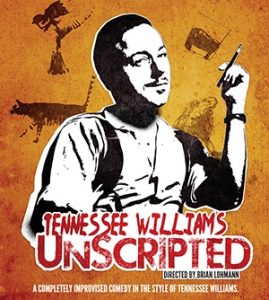 But while Impro members have learned from longform giants like Close and Keith Johnstone, they’re also informed by decades in shortform. Edi Patterson, for one, is also in the Groundlings main company. And almost thirty years ago, McShane helped put improv on the television map with the Channel 4 shortform hit Whose Line Is It Anyway? As a company, Impro’s roots are as deep as the medium’s.
But while Impro members have learned from longform giants like Close and Keith Johnstone, they’re also informed by decades in shortform. Edi Patterson, for one, is also in the Groundlings main company. And almost thirty years ago, McShane helped put improv on the television map with the Channel 4 shortform hit Whose Line Is It Anyway? As a company, Impro’s roots are as deep as the medium’s.
With a collective performance experience of hundreds of years, Impro Theatre has achieved popularity despite embracing a form so obscure that it has to be explained, entire, to every new booking agent. It is a form flexible and efficient enough to travel light and work on existing sets (or none at all), yet must be seen, often twice, to be divested of its associations. So Impro sells itself not by gimmick – “improv” is not a draw – but by excellence. In this sense it has the same job as any theater company.
The difference is that among scrappy companies the same age and size, Impro simply has a higher percentage of multiple threats. More than any theater I’ve seen as often as I’ve seen Impro, this company consistently insists on theatricality, on obstacle, on jeopardy, on character. No new play I’ve seen produced in the last five years at the Geffen Playhouse or the Mark Taper Forum has had the dramatic writing chops of a half-dozen I’ve seen written live by Impro. And none was better acted.
-uncle bob-
The company’s a big draw at every fancy house that invites it (Falcon Theatre, Pasadena Playhouse, North Coast Rep, Broad Stage, John Ford Amphitheatre), and it can’t sit still. Impro built its brand on genre and narrative improvisation, doing exhaustive research and rehearsal to extemporaneously perform two-act shows in the style of Sondheim, Chekhov, Shakespeare, and a half-dozen others. But the company is still expanding its repertoire.
Witness the recently closed Home for the Holidays. As a seasonal offering this new genre looks to me like a strong contender for perennial status: It’s got a built-in draw in that most of us like to watch other people suffer. It’s also an extremely funny, touching and honest entertainment.
The first act’s getting-to-know-you framework so far seems to offer less solid footing than, say, Impro’s takes on Chekhov or Tennessee Williams. One of the most striking elements of an Impro show is the solidity of the opening moments, the instant facility with decisions, the unhurried no-hesitation conviction of place and character. A couple of Home‘s wobbles early on, in establishing circumstance and character, were probably due more to having performed the genre only four times than to the fact that Chekhov hands you such a dense universe. If you can’t mine your own family, you shouldn’t be writing, and Home for the Holidays is already a more than promising show.
Most of the first act and all of the second were very sharp, edgy but not brutal, observational yet immediate, caustic without ugliness. The creepy uncle was less molester than meddler; the cat that got microwaved was the victim more of absent-mindedness than malevolence. The family nurtured and damaged and loved and stabbed each other in the back, just like every family I’ve known. Sure, the pornstar audience-suggestion at the top meant that a smartphone video later became the object of a full-cast eyebrow wag. But before you attribute that moment to the obliged-to-go-there nature of improv, consider that the play currently on offer at the Geffen includes a two-minute sequence in which nothing happens except people taking selfies.
The Home for the Holidays dinner scene was as simple and elegant a handling of props and set dressing as I’ve seen in almost any show scripted and directed beforehand. A spoon arrested halfway to the lips can be a tender moment, it can be scary, and it can be hilarious – until it gets thrown. You can trust Impro Theatre not to degenerate into a food fight. When John Ruskin said taste was the only morality, he was talking about these guys.
Impro is trying out another new genre this month. 1966 Holiday Variety Extravaganza opens for three dates at the Broad, beginning December 15. Apparently a take on fuzzy-sweater cold-war television specials of the Andy Williams school, and featuring a live band of improvisational musicians, the show might contain any number of elements. I imagine it will feature song and dance, comic sketches, lots of hobnobbing among cheerful pseudo-celebrities, but I don’t know for sure.
I asked permission to attend early rehearsals, as I have in the past for a show Impro had already done before, but was rebuffed by this new one. Understandably, not every member of the company is comfortable with an outsider writing down how the sausage gets stuffed. Integrity has to be fierce. Probity is not cheap. Impro knew that this article could have been even longer, but it resolutely said no. And so, as the lights go down at the Broad, I’ll be just as giddy as you will, if you can overcome your prejudice against that thing you saw that time that called itself improv.
posters and photos of previous shows courtesy of Impro Theatre
Impro Theatre
Impro Winterfest: L.A.’s International Genre & Narrative Improv Festival
December 6-10, 2016
for tickets and information, visit Impro
1966 Holiday Variety Extravaganza
December 15-17, 2016
The Broad Stage in Santa Monica
for tickets, visit The Broad
Dickens UnScripted
December 19, 2016
North Coast Rep
987 Lomas Santa Fe Drive in Solana Beach
for tickets, call 858.481.1055 or visit North Coast Rep
